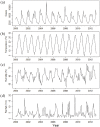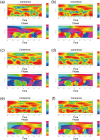Effect of non-stationary climate on infectious gastroenteritis transmission in Japan
- PMID: 24889802
- PMCID: PMC4042128
- DOI: 10.1038/srep05157
Effect of non-stationary climate on infectious gastroenteritis transmission in Japan
Abstract
Local weather factors are widely considered to influence the transmission of infectious gastroenteritis. Few studies, however, have examined the non-stationary relationships between global climatic factors and transmission of infectious gastroenteritis. We analyzed monthly data for cases of infectious gastroenteritis in Fukuoka, Japan from 2000 to 2012 using cross-wavelet coherency analysis to assess the pattern of associations between indices for the Indian Ocean Dipole (IOD) and El Niño Southern Oscillation (ENSO). Infectious gastroenteritis cases were non-stationary and significantly associated with the IOD and ENSO (Multivariate ENSO Index [MEI], Niño 1 + 2, Niño 3, Niño 4, and Niño 3.4) for a period of approximately 1 to 2 years. This association was non-stationary and appeared to have a major influence on the synchrony of infectious gastroenteritis transmission. Our results suggest that non-stationary patterns of association between global climate factors and incidence of infectious gastroenteritis should be considered when developing early warning systems for epidemics of infectious gastroenteritis.
Figures



References
-
- World Health Organization (WHO). The Global Burden of Disease: 2004 Update (WHO, Geneva, 2008).
-
- Checkley W. et al. Effect of El Niño and ambient temperature on hospital admissions for diarrhoeal diseases in Peruvian children. Lancet 355, 442–450 (2000). - PubMed
Publication types
MeSH terms
LinkOut - more resources
Full Text Sources
Other Literature Sources
Medical

